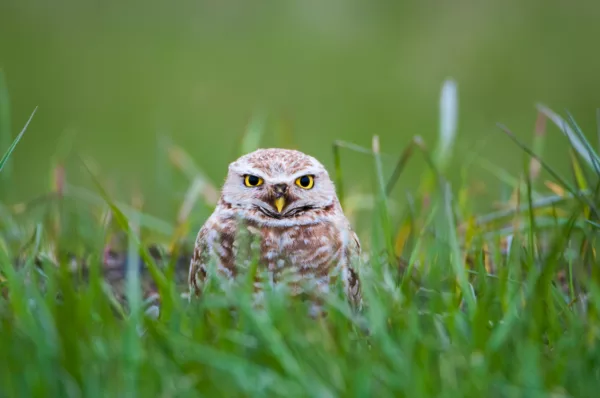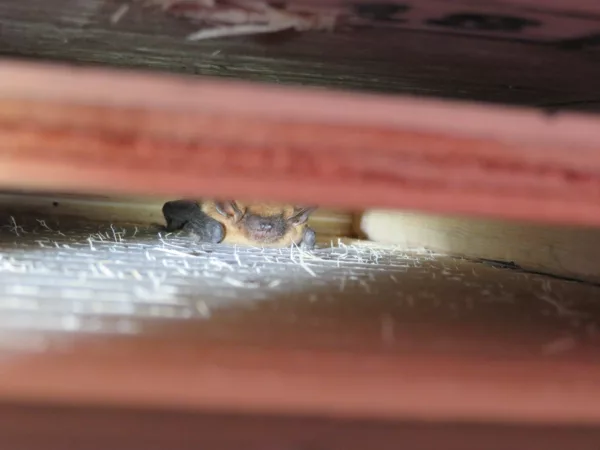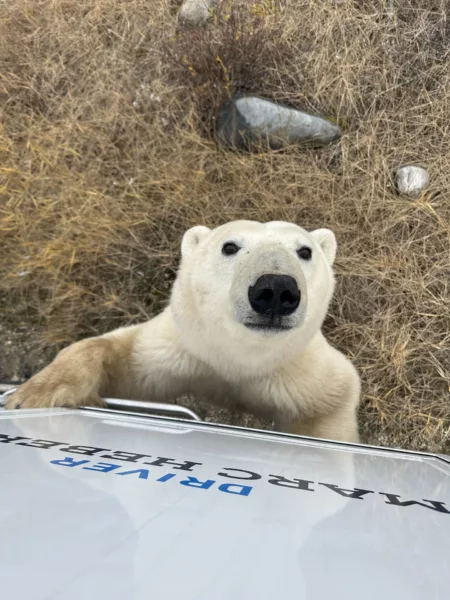In the Falkland Islands, Penguins Outnumber People

Sovereignty over the Falkland Islands has been a contentious issue between Britain and Argentina since the mid-1700s. Despite Britain winning the last battle in 1982, Argentina continues its fight for the land they call Islas Malvinas. But truth be told, neither country has a rightful claim—that honour belongs to its first and most populous inhabitants, the penguins.
 BJ Oudman
BJ Oudman
As many as one million penguins nest on the islands each summer, and only 3,531 people, according to the census in 2022. Only 15 of the 778 islands that constitute the Falklands are inhabited by humans. Tracking the number of penguins and their colony boundaries is tedious but critical work for conservation groups.
Five of the 18 species of penguins call Falklands home. Over half of the total number are rockhoppers (320,000 pairs in 2010). Approximately 120,000 pairs of gentoos, the largest population of them in the world, occupy about 85 unique colonies throughout the islands. Listed as Near Threatened, there are about 100,000 pairs of Magellanic penguins. Most of the 1,500 pairs of King penguins live at Volunteer Point. There is no animosity between the different species, even occasionally found living communally, like the few macaroni inhabitants (24 pairs) that reside with the rockhoppers. Other than the gentoos, all other species are migratory and spend only their summers on the islands.
 Lee Caldwell
Lee Caldwell
The Falkland Islands are not easy to access. Situated 480 kilometres from the nearest point of continental land and 670 kilometres from Ushuaia, Argentina, the nearest city where people can board a flight or ship, it is a destination that requires planning and purpose. I was fortunate to be on a ship that anchored in Stanley while making its way around Cape Horn up to Buenos Aires. I admit I knew nothing about penguins before that trip. James McParland, a geologist and teacher from Ontario was onboard the ship as a lecturer and to whom I give credit for educating myself and my fellow passengers about both the islands and their inhabitants.
In addition to its remoteness, the land is rugged with only a few paved roads found primarily near the capital, Stanley, and the Royal Air Force station. All other travel occurs on dirt tracks or overland through rockslides and tussock grass, requiring most residents to drive off-road vehicles. Even though most of the land is safe, a few land mines remain behind fenced-off areas. People are advised to stay out, but penguins appear light enough to avoid setting them off, oblivious to potential danger.
 BJ Oudman
BJ Oudman
The difficulty of getting to the islands and the terrain that covers them are two inherent factors in conservation. There is no easy public access to most colonies, as most are on sheep farms on private land. Those landowners do not own the penguins, but they do take an active role in protecting these unique birds.
The Falklands Government established an environmental department in 2020 that has a role in policy development and enforcement, as well as monitoring land and water activities, such as commercial fishing, which can interfere with the food supply of the pescatarian penguins. In addition to the government, many private organizations on the islands work collaboratively on common stewardship goals.
Falklands Conservation is the largest private organization for protecting not just the penguins, but other bird and animal species along with their habitats. Breeding colony rehabilitation to facilitate population growth is one of its priorities. One example is the Magellanic breeding ground at Ordnance Point, near Gypsy Cove.
 BJ Oudman
BJ Oudman
Another effort, not just in Falklands, but worldwide, is ocean cleanup. Although some debris is related to discarded fishing equipment and tourism, the vast majority is onshore litter that makes its way into the ocean. Disposable products eventually break down into microplastics and are ingested by marine animals. Penguins are particularly susceptible to toxins in the water, as those pollutants are stored in fat cells. Requiring a large amount of blubber under their skin to help protect them from the cold water, they are living barometers of the ocean’s health.
Marine debris is also increasing the temperature of ocean water. One direct result is the reduction of krill, a major food source for ocean marine life. The amount of these tiny pelagic crustaceans has reduced by nearly 80 per cent since the 1970s due to the loss of the ice algae they require for their diet. “Plastic is a battery. It absorbs the sun’s rays, raising the water temperature. Not only does this affect marine life directly, but it also leads to more evaporation. The clouds have to release the water they collect, causing major storms and flooding,” according to James Middleton, co-founder of Ocean Legacy Foundation, a Canadian non-profit organization focused on ending ocean plastic pollution.
Seeing penguins in their natural habitat is a magical experience. My most memorable moment was unexpected. While hiking the rockslides near Ordnance Point, two rogue king penguins waddled along the path towards me, allowing me to sit quietly in awe and observe the couple as they preened and interacted with each other, ignoring my human presence just feet away.
 BJ Oudman
BJ Oudman
Two popular spots where penguins can be observed without advance permission are Gypsy Cove and Yorke Bay, about seven kilometres from Stanley. There is a marked walking path to designated viewing platforms, where representatives from the Falkland Land Protection Agency are on duty during the peak season. “Our wardens are officially called Environment Wardens. They are employed on busy tourism days and their role is to prevent disturbance to wildlife as well as ensure visitors have a safe visit whilst upholding our Countryside Code. The Countryside Code is an official guidance document which was developed together with Falklands Conservation to help keep wildlife and the natural environment safe. Wardens are usually also happy to try to answer any questions you may have especially about wildlife and the work we do to protect it and monitor it,” explains Denise Blake, environmental officer and policy adviser for the Falklands Government.
From their prominent presence on items in the gift shops to the local Penguin News, there is no question of the relevance of penguins to residents and tourists alike. Education and awareness are the foremost factors in ensuring it stays that way. Visitors to the islands are encouraged to play their role in conservation, with the most fundamental takeaway to respect the captivating and loveable creatures that lived here long before people did.
More in Adventure Travel:
I Climbed a Glacier in Iceland and This Is How It Went
5 Places You Can Paddle When Canada Is Locked Into Winter
Hiking in Alaska: A Guide for the First-Time Hiker














